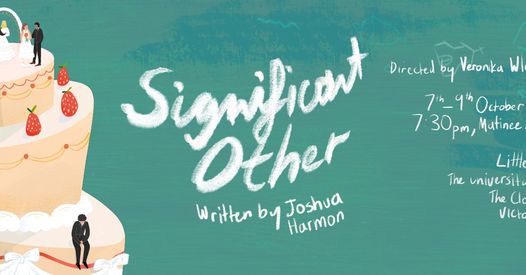Veronika Wlodarczyk has certainly made a confident and impressive debut as a director with Significant Other. The performance, before an appreciative and generous sized opening night audience, was well cast and maintained both the pace and required balance of comedy and pathos.
This Joshua Harmon play premiered Off-Broadway in 2015 and deals mainly with the emotional trials of Jordan Berman, the archetypical ‘gay best friend’ of three young women who all marry, to his increasing dismay. Try though he does, – at times excruciatingly desperately – he fails to find his own life partner.
James Fazzalari was certainly convincing as Jordan. This was his first lead role, and it was a demanding one, requiring often immediate changes of scene and focus. Fazzalari endeared himself to us from the outset and skilfully handled the considerable emotional range. Jordan bears the stereotypical self doubt of the young American Jewish man and although this production was adapted to an Australian setting, Fazzalari sustained that character. A minor change to the pattern was that in the place of a domineering mother, Jordan had a no-nonsense yet sympathetic grandmother, Helene. Kyla Booth handled the role with aplomb.
Jordan’s three female friends were convincingly delineated. Mary McAuliffe was sassy and self-confident as the talkative Kiki. Of all the characters’ language, hers probably translated best into the Australian idiom. Issy Soulsby was restrained, calm and controlled as Vanessa, providing a nice contrast. Dora Stamos impressed as Jordan’s ‘bestie’ and former flat-mate Laura. She showed him empathy when required and yet was able to raise the energy and anger on other occasions. A good example was in their fiery argument when he objected to not being chosen as a bridesmaid at her wedding, in which he told her, ‘Your wedding is my funeral’. She readily matched his heat.
Oswin Kwan (Zach, Evan and Roger) and Nick Kennett (Will, Conrad and Tony) each played their three roles effortlessly and smoothly – often very quickly making the changes. It was a successful device, assisted by the simple and effective set and lighting. On the main level were a number of separate scenes which worked remarkably well, especially considering the restricted area available. Above, was Helene’s granny flat, which provided a good change of focus and mood. In all, the intimacy of the Little Theatre was well suited to the play’s purposes.
This production illustrated yet again how important the Theatre Guild is to the local theatre scene, in this case by supporting emerging talent through its Student Society.



